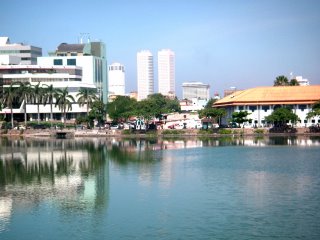...ruminations from previous Economic Journalists' conference...please excuse the flatulent acronyms!
Ok, so the purpose of this conference was to disseminate the horrors of free trade, particularly within free trade agreements (FTAs), to reporters. By stating the holistic, social implications of trade liberalisation, which in effect, pries open protected state services, such as health, education, water/sanitation, LIBRARIES?!, hopefully Asian media will better report the (dis)advantages of governments' entries into FTAs. Moreover, certain investors, like pharmaceutical/agro-business/multinational corporations benefit more from these trade agreements, while smaller, domestic industries become more vulnerable.
Most FTAs are made compatible with the World Trade Organization (WTO) framework, usually under the direction of US/EU. FTAs are very conspicuous political tools, in the best cases, and draconian, death sentences (i.e. to small farmers) in the worst scenarios. More often than not, bilateral free trade agreements (between two countries) exemplify unequal trade relations, as they give an upper hand to one of the signatories. Regional trade agreements are touted as taking into account plural interests, but you still see uneven alliances and divisions, even within a regional bloc of megadiverse countries. I know it’s heavy to debunk all attempts at free trade, but the current pattern is to benefit the already industrialized, powerful North through induced competition. Is cooperativism, on multiple levels, or capping development to some degree completely out of the question?
Within these FTAs, certain provisions are tightened, such as ratcheting up investment standards and strengthening intellectual property regulations. Some of my beef with the intellectual property (IP) system is as follows:
- legitimizes appropriated knowledge from local, indigenous and otherwise off-the-radar communities, which is without ethical consultation, equitable benefit sharing, due recognition, or any other, non-monetary incentives
- monopolizes control over patents to one holder, while most knowledge is built on previous, accumulated knowledges
- makes it harder for developing countries to access the tools needed to reproduce innovations ---(impedes technology transfer and generic medicine production)
- all WTO members and wannabes must adhere to same IPR rules or sui generis (self-generated system), of equal stringency
- does not take into account the masculinized institutions that created IP, nor the very different development strategies of different countries, nor alternative methods for protecting knowledges
- WTO TRIPS (Trade-Related Agreement on Intellectual Property Rights) is not coherent with UN Convention on Biological Diversity (CBD), is not ecologically sustainable, only focuses on short term benefits
-in effect, promotes genetically-modified foods and discourages free sharing of seeds; massive blow to majority farmers
- not to mention, there are too many bloody loopholes (i.e. evergreening strategies), which continue to grant ownership of at least 90% of world’s patents to Northern Multinationals, uh, most in US
- the amount of wealth that is generated by IPR, which goes to US, (from Hollywood movies, music, software, & other copyrights), goes into very few, elitist pockets, is not duly paid to actual artists/creators but corporations, and is very rarely redistributed
- and so forth…
Hence, I’m not sure how best to report that United States FTAs' intellectual property rights (IPR) clauses for data exclusivity prevent Asian countries from producing generic medicines. How do I best synopsize that even US Patent and Trademark Office (USPTO) is worried about all the stringent IPR provisions in all US bilateral FTAs with Asian, Latin American and Middle Eastern countries, because USPTO will be overwhelmed from litigation and enforcing patent protection? It already is understaffed and underresourced. It is interesting to note that even US FTAs are superceding national legislation to become these muscular, beastly trade agreements that pander to US (pharmaceutical) companies. I mean, Ely-Lilly and Pfizer are the architects behind the IPR regulations in the trade agreements, which flies in the face that US FDA or USPTO really want this level of stringency. Phoah! Who knew that these US government agencies, in addition to the generic pharmaceutical industry, are also digging their heels and trying to lasso these FTAs?
...On a side note…when studying services privatization, I learned that most privatization contracts (with big corps like Vivendi, Suez and Florida Power & Light) that were contested or under negotiation by countries before last year, were pushed through after the Boxing Day tsunami, as part of reconstruction package. However, in Thailand, such recovery deals were too expensive and people would not be able to cover costs for a waste/sanitation system, so some foreign utility companies sought compensation for the contract failure. United Utilities is set to gain $88 million GBP, or about 1/3 of all donations made by Brits for tsunami relief! (PSIRU 2005). What a brilliant way to spend relief aid…I will comment about some of difficulties in Sri Lanka’s reconstruction shortly.
23 December 2005
22 December 2005
Big Boss dancing ecstatically
This photo is from the office holiday soiree, held at a local booty night club, Clancey's. Clancey's pub is notorious for catering to all the tourists, expats and government ministers' sons. These ministers' sons bascially live it up in the city, are associated with violent gangs, and literally get away with murder. There were several cases in the late 90s and beginning of millennium, where ministers' sons, doped up on hard drugs, killed (or their henchmen) clubgoers that insulted them in some minute way or another. Because of their immense wealth, there have been no investigations, so they are free to do as they please around the city. However, many locals tell me that if I go out with good people, who do not necessarily cause trouble or pick fights, I should be fine. Yet if I wanted to go clubbing regularly, I'd have gotten it out of my system in NYC. But adopting a Western-style nightlife is THE thing to do for most middle class locals. I've even been invited to a New Year's bash on the beach, but I'd rather see the country or hole up with my books...Anyway, the big boss is a very kind man, but a bit disconnected from his staff. Moreover, I've offered to housesit for him, while he visits his family in the States for holidays. He has a rabbit that I can play with, and a ludicrously large colonial mansion, complete with an army of servants. Most (except for security) are off while away. This is how development workers' live...secluded behind high walls, perpetuating the divisions between local staff and international folks in positions of authority.


Subscribe to:
Comments (Atom)










